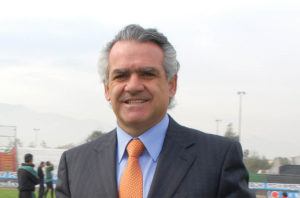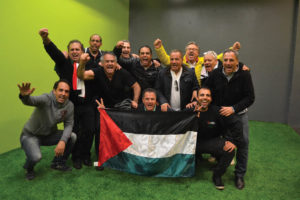By Xavier Abu Eid
Born to a family of immigrants from Beit Jala, Fernando Aguad (born in 1960 in Arequipa, Peru) lived a life similar to many other Palestinians in Latin America. After graduating from the prestigious Colegio San Ignacio El Bosque, a school run by Jesuits in Santiago de Chile, he entered into the family’s textile business. In the course of his career, he moved into banking and became a prominent member of several institutions. Yet many more people heard of him after 2011, the year in which he became president of Club Deportivo Palestino, the football club founded by Palestinian expatriates in 1920 in Santiago.

Fernando Aguad’s life has been marked by his Palestinian ancestry. “When my family got together, they would talk about their olives and their land, but mainly they would speak about the apricots. They spent hours harvesting them and more hours comparing them with the apricots of Palestine. Everyone agreed that in Palestine the apricots were sweeter,” he reminisces, referring to the ancient mishmish bajjali, the baladi (lit. country) apricot. As a member of the Palestinian Club, the main social institution of the Palestinian community in Santiago, he met many people who brought him closer to Palestine. Encouraged by his late sister Sonia and a group of friends, Fernando learned more and more about the Palestinian cause. Instrumental at this stage of his life was the late Eugenio Chahuan (Shahwan), the founder of the Center for Arab Studies at the University of Chile.
Whoever follows closely the news about Palestino must have noticed that Aguad’s taking up the club presidency marked a turning point. Fernando just about made it his personal challenge to advance the team that at the time was not achieving the expected results. And things did change. “In 2012, I organized an event with the players at the Palestinian Club,” he remembers. “I told them about Mohammad Assaf’s victory in the Arab Idol contest. How he came from Gaza and made great efforts to finally be able to give our people happiness and pride. I told them that we could do that too. We also could give the Palestinian people who live under occupation a reason to feel proud. ‘We can give them happiness,’ I said. ‘And I’m sure this is how they feel when they see our colors, our flag. When they watch us playing in the most important stadiums of Latin America, against great teams like Boca Juniors, River Plate, or Flamengo.’”
When the map of historic Palestine was added to the jersey, a campaign against the team was initiated by Zionist organizations. Yet neither the team nor Aguad were intimidated. “The team is not political, the map is a symbol of our identity. This is how Palestine was in 1920 when the team was created,” Aguad stated.
Fernando is proud of having sent the mayor of La Cisterna, the municipality in which the football team is based, to Palestine, followed by an event that allowed the mayor to share his experiences with other Chilean authorities. Under his presidency, the team adopted the slogan “More than a team, a whole nation” Aguad wants to open up the team to include all Palestinians. “I invite everyone to become a member of our team, to get the jerseys, to follow us,” he asserts.
Fernando was decorated in 2015 by the State of Palestine with the “Star of Palestine” for his role as club president and for his engagement in promoting the Palestinian cause. When asked about a dream, he did not think for a second before he stated, “I wish to create awareness about Palestine, to let people know how the daily reality of the Palestinian people is, how they struggle for freedom, for statehood. And I wish to accomplish all of this through our football team.”


